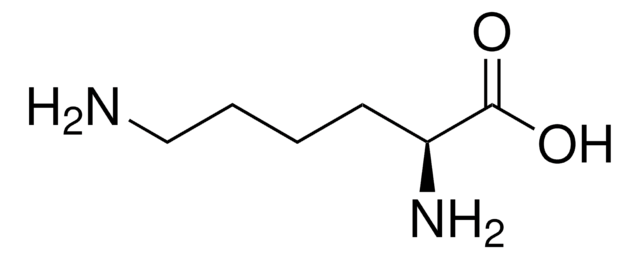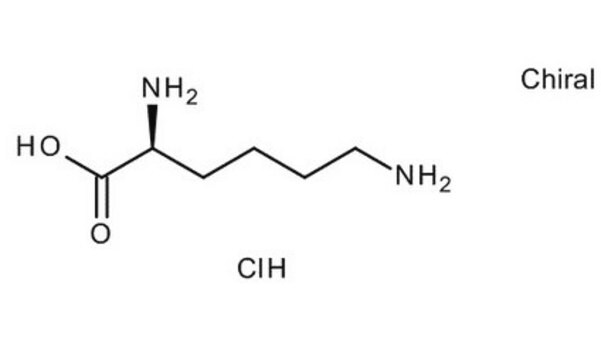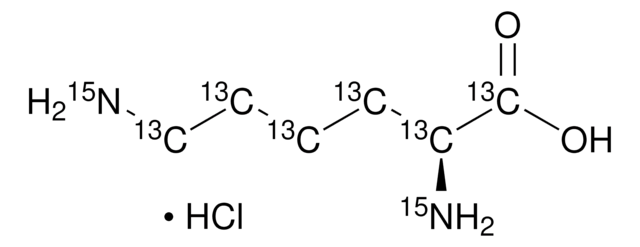L8662
L-Lysine monohydrochloride
98.5-101.0%, suitable for cell culture, non-animal source, meets EP, JP, USP testing specifications
Synonym(s):
(S)-2,6-Diaminohexanoic acid monohydrochloride
About This Item
Recommended Products
Product Name
L-Lysine monohydrochloride, from non-animal source, meets EP, JP, USP testing specifications, suitable for cell culture, 98.5-101.0%
biological source
non-animal source
Quality Level
Agency
meets EP testing specifications
meets JP testing specifications
meets USP testing specifications
Assay
98.5-101.0%
form
powder
quality
meets EP, JP, USP testing specifications
technique(s)
cell culture | mammalian: suitable
impurities
endotoxin, tested
color
white
mp
263 °C (dec.) (lit.)
solubility
H2O: 100 mg/mL
application(s)
pharmaceutical (small molecule)
SMILES string
OC([C@@H](N)CCCCN)=O.[H]Cl
InChI
1S/C6H14N2O2.ClH/c7-4-2-1-3-5(8)6(9)10;/h5H,1-4,7-8H2,(H,9,10);1H/t5-;/m0./s1
InChI key
BVHLGVCQOALMSV-JEDNCBNOSA-N
Looking for similar products? Visit Product Comparison Guide
Application
- Scientific opinion on the presence of DNA in the feed additives consisting of concentrated liquid l-lysine, l-lysine monohydrochloride and concentrated liquid l-lysine monohydrochloride produced by Escherichia coliNITE BP-02917 for all animal species (METEX NOOVISTAGO).: This study explores the presence of DNA in l-lysine monohydrochloride and its variants used in animal feed, addressing safety concerns associated with genetic material in feed products (EFSA Panel et al., 2023).
- Safety and efficacy of a feed additive consisting of concentrated liquid l-lysine, l-lysine monohydrochloride and concentrated liquid l-lysine monohydrochloride produced by Escherichia coliNITE BP-02917 for all animal species (Metex NoovistaGo).: Evaluates the safety and efficacy of l-lysine monohydrochloride in animal feed, contributing to a better understanding of its use and regulatory compliance (EFSA Panel et al., 2022).
- Safety and efficacy of a feed additive consisting of l-lysine monohydrochloride and l-lysine sulfate produced by fermentation with Corynebacterium glutamicumCGMCC 17927 for all animal species (Barentz Animal Nutrition B.V.).: This publication assesses the safety and effectiveness of l-lysine monohydrochloride and l-lysine sulfate in various animal feeds, ensuring they meet health and nutritional standards (EFSA Panel et al., 2022).
- Safety and efficacy of a feed additive consisting of l-lysine monohydrochloride and l-lysine sulfate produced by Corynebacterium glutamicum CGMCC 14498 for all animal species (Kempex Holland BV).: Investigates the implications of using l-lysine monohydrochloride and l-lysine sulfate in feed, focusing on their impact on animal health and growth (EFSA Panel et al., 2021).
- Safety and efficacy of the feed additives concentrated liquid l-lysine (base) and l-lysine monohydrochloride produced by Corynebacterium glutamicum KCCM 80183 for all animal species (CJ Europe GmbH).: Analyzes the safety and benefits of concentrated liquid l-lysine and l-lysine monohydrochloride, detailing their advantages and regulatory approval for use in feed (EFSA Panel et al., 2021).
Storage Class Code
11 - Combustible Solids
WGK
WGK 1
Flash Point(F)
Not applicable
Flash Point(C)
Not applicable
Personal Protective Equipment
Choose from one of the most recent versions:
Already Own This Product?
Find documentation for the products that you have recently purchased in the Document Library.
Customers Also Viewed
Our team of scientists has experience in all areas of research including Life Science, Material Science, Chemical Synthesis, Chromatography, Analytical and many others.
Contact Technical Service












